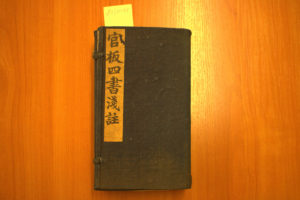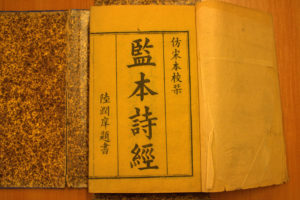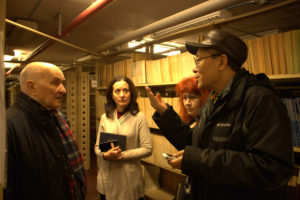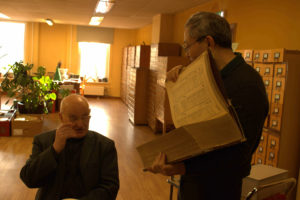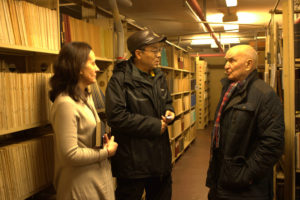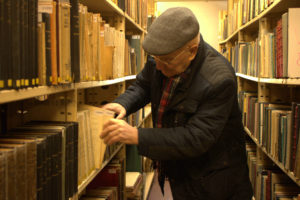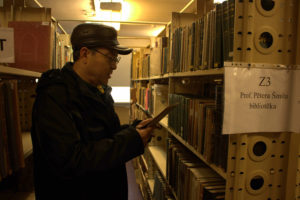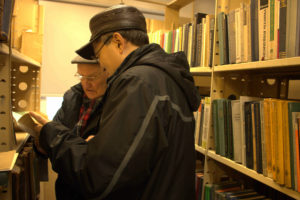A Meeting Across Time and Space After Years
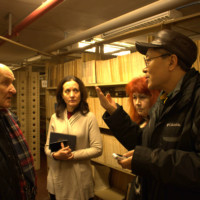
当地时间2019年1月18日,拉脱维亚大学孔院两位院长参访了拉大图书馆书库,他们与书库负责人一起,查阅了拉脱维亚第一代汉学家施密特教授的丰富藏书和学术成果,特别是搜集了他有关汉学研究和汉语教学的成果。今年是施密特教授诞辰150周年和拉脱维亚大学成立100周年,2019年4月拉脱维亚大学图书馆和拉脱维亚大学孔子学院也将联合举办施密特教授学术遗产国际研讨会。
彼得·施密特(Pēteris Šmits,1869-1938)是杰出的语言学家,民族志学家,民族学家,民俗学家和汉学家。他在莫斯科大学(1891-1892)学习语言学,在圣彼得堡大学(1892-1896)学习东方语言,随后在北京(1896-1899)实习。实习期间,他除了担任首席俄语教师外,还积极参与第一所中国大学北京大学(即京师大学堂,1898年)的创建。回到沙皇俄国后,这位年轻的科学家参与了符拉迪沃斯托克东方学院(1899年)的创建。1902年,施密特通过了博士论文《官话语法》(即《汉语普通话语法)(Опыт мандаринской грамматики с текстами для упражнений)答辩,成为该学院教授,讲授汉语、满语、蒙古语及阿尔泰语,后出任东方学院院长。在研究工作中,他在中国东北、蒙古、俄罗斯远东和西伯利亚进行了广泛的民族志调查。期间,他为他个人以及学院图书馆收藏了宝贵的文物。1920年,施密特回到刚独立的拉脱维亚,成为拉脱维亚大学(即拉脱维亚高等学校)语言学及哲学学院的一员。他开设了拉脱维亚神话、中文概论、汉语和亚洲文化等讲座,并出任校长和院长。在他的后半生,收集了拉脱维亚神话、传说、寓言并对其进行了分类,他加工编撰的作品被认为是迄今为止这个领域最著名的科学出版物。他还从根本上促进了拉脱维亚语言学和民族志学研究的发展,他的作品现在是进一步研究拉脱维亚叙事民俗学的坚实基础。施密特教授将他珍藏的2162本宝贵资料捐给拉脱维亚大学,成为最大的捐赠者之一。其中,有关东方研究的资料,如汉学、满学、阿尔泰学、蒙古学和日本学资料最具价值和意义。他的藏书包括中文、满文、日文、蒙古文、通古斯文、乌德盖文、那乃文等版本。其中,称得上是瑰宝的莫过于中文和满文的书籍和手稿,尤其是刻本。施密特教授对拉脱维亚神话、信仰、民歌、童话和传说的研究以及他有关波罗的海语言学和民族学的著作,给他的捐赠增添了额外的宝贵价值。拉脱维亚大学以施密特教授留下的科学和文化遗产为荣,这些遗产现已成为拉脱维亚大学的宝贵财富。1928年,他被授予瑞典乌普萨拉大学荣誉博士,1938年,他获得拉脱维亚政府最高奖三星勋章。
联合国教科文组织将施密特教授诞辰150周年和拉脱维亚大学诞辰100周年列入2018-2019年度纪念日历中,以纪念他对拉脱维亚以及世界教科文发展作出的突出贡献。在该活动框架内,计划推广施密特教授的精神遗产,并强调他对波罗的海地区研究和汉学研究发展的影响,强调科学的连续性和国际合作的重要性。该活动将有助于收集和研究有关施密特教授档案材料信息,从而为拉脱维亚、中国、德国、俄罗斯、匈牙利和其他国家的各学科的科学家提供创造性的合作机会,并向社会宣传施密特教授的人格魅力以及他对汉学和波罗的海学的贡献。该活动最重要的计划项目有:1)组织国际会议,探讨施密特教授的活动和遗产;2)出版会议论文;3)将举办展览,展示从各图书馆和博物馆收集的相关文献资料。
在拉大图书馆书库,尚院长看着贝院长在施密特教授丰富的藏书堆里认真查阅资料,并讲述施密特教授的非凡经历和巨大贡献,忽然眼睛发热泛红,一片朦胧,彷佛穿越了时空,看到了拉脱维亚两位伟大汉学家和汉语教学泰斗并肩站在了一起。贝德高教授和施密特教授虽然生活在不同时代,然而他们有着神奇的相同经历:他们都在莫斯科大学学习,都在远东大学任教,都回到拉脱维亚并在拉脱维亚大学任教,都获得拉脱维亚最高荣誉“三星勋章”。最奇妙的是,两位教授名字都叫彼得,而彼得·施密特1938年去世,彼得·贝德高1938年出生,后者彷佛是前者的转世和化身,前者是拉脱维亚第一次独立后的伟大汉学家和汉语教学拓荒者,而后者是拉脱维亚恢复独立后的伟大汉学家和汉语教学泰斗,他们是拉脱维亚汉学研究和汉语教学的奠基者和传承者,他们象征、凝聚和承载着拉脱维亚独立百年来汉学研究和汉语教学的光荣传统。
On January 18th, 2019, two directors of Confucius Institute at University of Latvia visited Storehouse of Library of University of Latvia.Together with the head of the library, they searched the rich collection of books and academic contributions of the first Latvian Sinologist Professor Pēteris Šmits, especially his research on Sinology and Chinese teaching. This year marks the 150th anniversary of Professor Šmits’s birth and the 100th anniversary of the University of Latvia. In April 2019, the Library and the Institute will jointly organize an international seminar on Professor Šmits’s academic heritage.
Pēteris Šmits (1869-1938) is known worldwide as a linguist, ethnographer, folklorist and sinologist. P. Šmits studied philology at University of Moscow (1891-1892) and Oriental languages at University of Saint Petersburg (1892-1896), and had internship in Peking (1896-1899). During his internship as the chair teacher of Russian language, P. Šmits also actively took part in the establishment of the first Chinese university (1898, today’s Beijing University). After returning to the tsarist Russia the young scientist participated in the establishment of Oriental Institute in Vladivostok (1899).In 1902, after defending his thesis on Chinese Mandarin grammar (“Опыт мандаринской грамматики с текстами для упражнений”), P. Šmits became a professor of this Institute and lectured on Chinese, Manchu and Mongolian philology and also Altaistic. Later, he became the head of the Insitute. During his research work, P. Šmits carried out various ethnographic field investigations in China, Manchuria, Mongolia, the Far East of Russia and Siberia. There he obtained valuable items for the library of Institute and also for his private collection. In 1920, P. Šmits returned to newly independent Latvia to join the academic staff of the Faculty of Philology and Philosophy at the Higher School of Latvia (today’s University of Latvia). There he delivered lectures in the disciplines of Latvian mythology, introduction to Chinese Philology, Chinese Language and Asian Culture etc. He also became Vice-Rector of the Universiyt and Dean of the Faculty. During the second half of his life, P. Šmits collected and classified Latvian fables, tales and fairy-tales, and the materials he processed are considered to be the most notable scientific publications of this sort up to the present day. P. Šmits has also fundamentally contributed to the development of Latvian linguistics and ethnographic research and his works are now a powerful basis for further research on Latvian narrative folklore. The collection of P. Šmits’s books is one of the biggest donations and this valuable special collection contains 2162 items. Editions in Oriental studies, like Sinology, manchurology, altaistics, mongolistics and Japanistics are of the greatest value and significance. The collection includes texts of editions in Chinese, Manchu, Japanese, Mongolian, Tungus, Udege, Nanai etc. The pearls of this collection are Chinese and Manchu books and manuscripts, especially xylographs. The Professor’s research on Latvian mythology, beliefs, folksongs, fairytales and legends, as well as works in Baltic philology and ethnology, give an additional value to this donation. The University of Latvia is proud of the scientific and cultural heritage left by P. Šmits, which has now become its property. In 1928 he was awarded the title of Honorary Doctor of Uppsala University and in 1938 was granted “the Order of the Three Stars”.
The 150th birth anniversary of Pēteris Šmitsand the 100th anniversary of University of Latviais are both included in the UNESCO Calendar of Anniversaries 2018-2019, commemorating his activities not only in the Latvian dimension, but also in the development of world culture, education and science. Within the framework of the project, it is planned to promote the heritage of Pēteris Šmits and to highlight the influence of his activities on the development of Baltic studies and Sinology, accentuating the continuity in science and the significance of international cooperation. This project will enable the gathering of information about and the intensifying of studies about P. Šmits’s archive materials, to provide creative cooperation between scientists of various branches from Latvia, China, Germany, Russia and other countries. It is planned to create various events to inform the society about the personality of P. Šmits and his contribution to Sinology and Baltistics. The most significant planned project activities are: 1) to organize an international conference, devoted to the investigation of Pēteris Šmits activities and heritage; 2) to publish the conference abstracts; 3) concomitantly with the conference, it is planned to create an exhibition gathering the available documentary heritage from various libraries and museums.
In the Storehous of Library of University of Latvia, Professor Shang Quanyu witnessed Professor Pēteris Pildegovičs’serching for the materials in Professor Šmits’s rich collection of books, and his remarking about Professor Šmits’s extraordinary experience and great contributions. Suddenly, Professor Shang’s eyes became red, as if he saw the two great Sinologists and Chinese teaching masters standing side by side across time and space. Professor Pildegovičs and Professor Šmits lived in different eras, but they had the same magical experiences: they both studied at Moscow University; they both taught at Far Eastern University; they both returned to Latvia and taught at University of Latvia, and they both got the highest honor “Order of the Three Stars” in Latvia. The most amazing thing is that the names of the two professors are the same — Pēteris, and while Pēteris Šmits died in 1938, Pēteris Pildegovičs was born in 1938. The latter seems to be the reincarnation and incarnation of the former. While the former is the great Sinologist and Chinese teaching pioneer after Latvia’s first independence, the latter is the great Sinologist and Chinese teaching master after the restoration of independence in Latvia. They are the founders and inheritors of Latvian Sinology and Chinese teaching. They symbolize, unite and carry the glorious tradition of Sinology research and Chinese teaching in Latvia since its independence over the past 100 years.